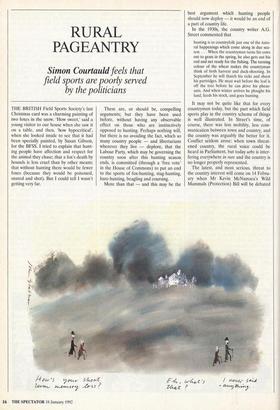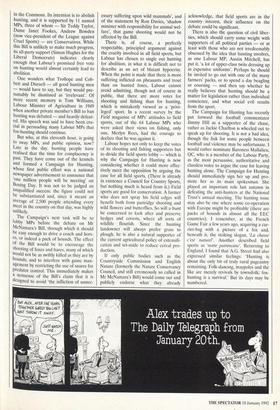RURAL PAGEANTRY
Simon Courtauld feels that
field sports are poorly served by the politicians
THE BRITISH Field Sports Society's last Christmas card was a charming painting of . two foxes in the snow. 'How sweet,' said a young visitor to our house when she saw it on a table, and then, 'how hypocritical', when she looked inside to see that it had been •specially painted, by Susan Gibson, for the BFSS. I tried to explain that hunt- ing people have affection and respect for the animal they chase; that a fox's death by hounds is less cruel than by other means; that without hunting there would be fewer foxes (because they would be poisoned, snared and shot). But I could tell I wasn't getting very far. These are, or should be, compelling arguments; but they have been used before, without having any observable effect on those who are instinctively opposed to hunting. Perhaps nothing will, but there is no avoiding the fact, which so many country people — and libertarians wherever they live — deplore, that the Labour Party, which may be governing the country soon after this hunting season, ends, is committed (through a 'free vote' in the House of Commons) to put an end to the sports of fox-hunting, stag-hunting, hare-hunting, beagling and coursing.
More than that — and this may be the best argument which hunting people should now deploy — it would be an end of a part of country life.
In the 1930s, the country writer A.G. Street commented that hunting is to countryfolk just one of the natu- ral happenings which come along in due sea- son.... When the countryman turns his cows out to grass in the spring, he also gets out his rod and net ready for the fishing. The turning colour of the wheat makes the countryman think of both harvest and duck-shooting. In September he will thatch his ricks and shoot his partridges. He must wait before the leaf is off the tree before he can drive his pheas- ants. And when winter arrives he ploughs his land, feeds his stock, and goes hunting.
It may not be quite like that for every countryman today, but the part which field sports play in the country scheme of things is well illustrated. In Street's time, of course, there was less mobility, less com- munication between town and country, and the country was arguably the better for it. Conflict seldom arose: when town threat- ened country, the rural voice could be heard in Parliament, but today urbs is inter- fering everywhere in cure and the country is no longer properly represented.
The latest, and most serious, threat to the country interest will come on 14 Febru- ary when Mr Kevin McNamara's Wild Mammals (Protection) Bill will be debated in the Commons. Its intention is to abolish hunting, and it is supported by 11 named MPs, three of whom — Sir Teddy Taylor, Dame Janet Fookes, Andrew Bowden (now vice-president of the League against Cruel Sports) — are Conservatives. While this Bill is unlikely to make much progress, its all-party support (Simon Hughes for the Liberal Democrats) indicates clearly enough that Labour's promised free vote on hunting would almost certainly lead to abolition.
One wonders what Trollope and Cob- bett and Disraeli — all good hunting men — would have to say, but they would pre- sumably be dismissed as Irrelevant'. Of more recent memory is Tom Williams, Labour Minister of Agriculture in 1949 when another private member's Bill to ban hunting was debated — and heavily defeat- ed. His speech was said to have been cru- cial in persuading many Labour MPs that fox-hunting should continue.
But who, at this eleventh hour, is going to sway MPs, and public opinion, now? Late in the day, hunting people have realised that the time for complacency is past. They have come out of the kennels and formed a Campaign for Hunting, whose first public effort was a national newspaper advertisement to announce that `one million people will be meeting' on Boxing Day. It was not to be judged an unqualified success: the figure could not be substantiated and, since it meant an average of 2,500 people attending every meet in the country on that day, was highly unlikely.
The Campaign's next task will be to lobby MPs before the debate on Mr McNamara's Bill, through which it should be easy enough to drive a coach and hors- es, or indeed a pack of hounds. The effect of the Bill would be to encourage the shooting of foxes and hares, many of which would not be as swiftly killed as they are by hounds; and to interfere with game man- agement by restricting the use of snares for predator control. This immediately makes a nonsense of the Bill's claim that it is designed to avoid 'the infliction of unnec-
essary suffering upon wild mammals', and of the statement by Ron Davies, 'shadow minister with responsibility for animal wel- fare', that game shooting would not be affected by the Bill.
There is, of course, a perfectly respectable, principled argument against the cruelty involved in all field sports, but Labour has chosen to single out hunting for abolition, in what it is difficult not to describe as an act of blatant hypocrisy. When the point is made that there is more suffering inflicted on pheasants and trout than on hunted foxes, Labour cannot avoid admitting, though not of course in public, that there are more votes for shooting and fishing than for hunting, which is mistakenly viewed as a `privi- leged' sport. In a recent survey by the Field magazine of MPs' attitudes to field sports, out of the 64 Labour MPs who were asked their views on fishing, only one, Merlyn Rees, had the courage to declare that he was against it.
Labour hopes not only to keep the votes of its shooting and fishing supporters but to divide the field sports lobby — which is why the Campaign for Hunting is now considering whether it could more effec- tively meet the opposition by arguing the case for all field sports. (There is already in existence a Council for Country Sports, but nothing much is heard from it.) Field sports are good for conservation. A farmer who does not spray his field edges will benefit both from partridge shooting and wild flowers and butterflies. So will a hunt be concerned to look after and preserve hedges and coverts, where all sorts of wildlife flourish. Since the hunting landowner will always prefer grass to plough, he is also a natural supporter of the current agricultural policy of extensifi- cation and set-aside to reduce cereal pro- duction.
If only public bodies such as the Countryside Commission and English Nature (formerly the Nature Conservancy Council, and still erroneously so called in Mr McNamara's Bill) would come out and publicly endorse what they already acknowledge, that field sports are in the country interest, their influence on the debate could be significant.
There is also the question of civil liber- ties, which should carry some weight with supporters of all political parties — or at least with those who are not irredeemably obsessed by the idea that hunting involves, as one Labour MP, Austin Mitchell, has put it, 'a lot of upper-class twits dressing up in expensive uniforms'. Perhaps he should be invited to go out with one of the many farmers' packs, or to spend a day beagling or coursing — and then say whether he really believes that hunting should be a matter for legislation rather than individual conscience, and what social evil results from the sport.
The Campaign for Hunting has recently put forward the football commentator Jimmy Hill as a supporter of the chase, rather as Jackie Charlton is wheeled out to speak up for shooting. It is not a bad idea, though the link for some people between football and violence may be unfortunate. I would rather nominate Baroness Mallalieu, QC, who is a member of the Labour Party, as the most persuasive, authoritative and classless voice to argue the case for leaving hunting alone. The Campaign for Hunting should immediately sign her up and pro- mote her as its main spokesman. She played an important role last autumn in defeating the anti-hunters at the National Trust's annual meeting. The hunting issue may also be one where some co-operation with Europe might be profitable (there are packs of hounds in almost all the EEC countries). I remember, at the French Game Fair a few years ago, acquiring a car- rier-bag with a picture of a fox and, beneath it, the striking slogan, `La chasse c'est naturel'. Another described field sports as 'noire patrintoine'. Returning to England, I found that A.G. Street had also expressed similar feelings: 'Hunting is about the only bit of truly rural pageantry remaining. Folk-dancing, maypoles and the like are merely revivals by townsfolk; fox- hunting is a survival.' But its days may be numbered.



















































 Previous page
Previous page